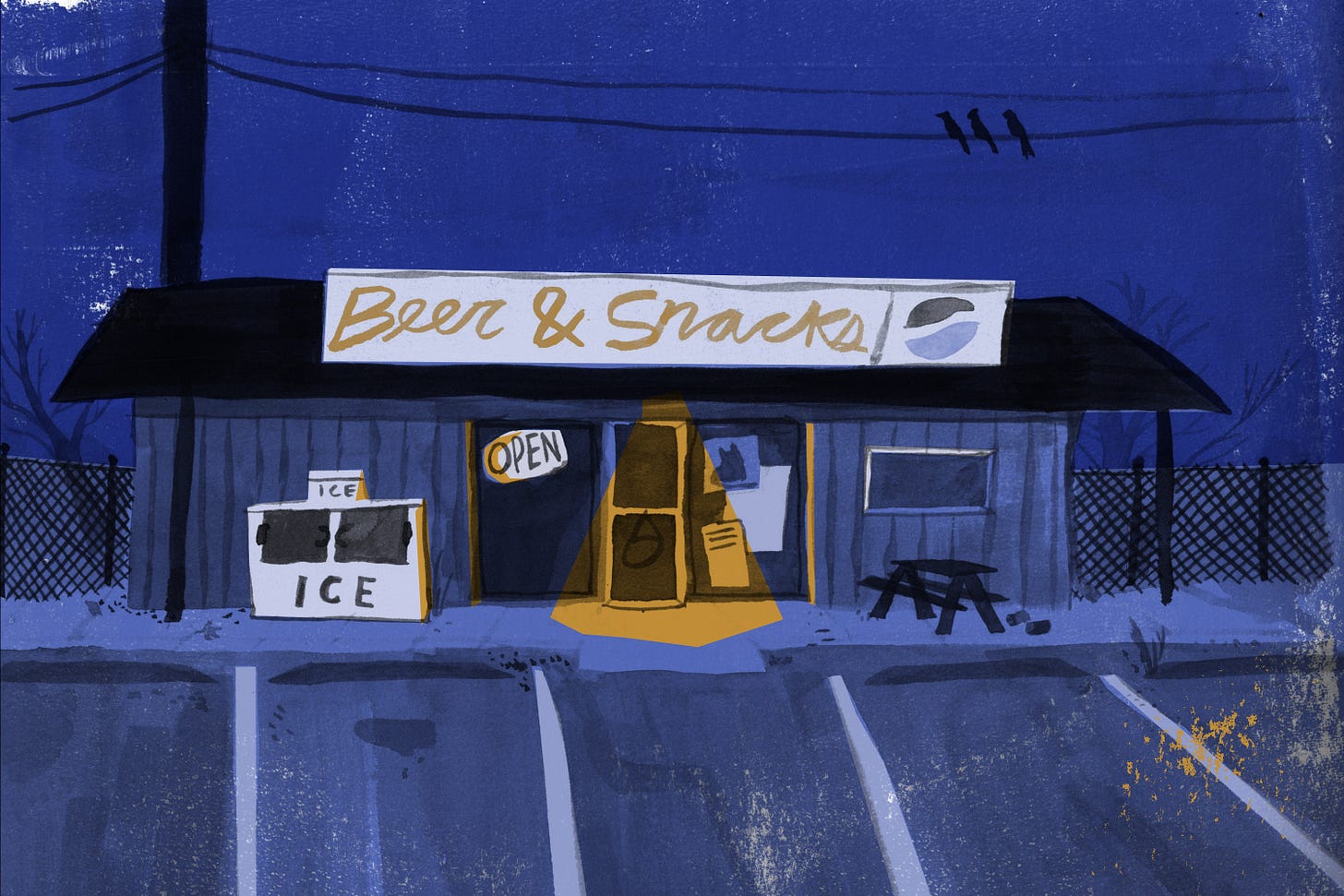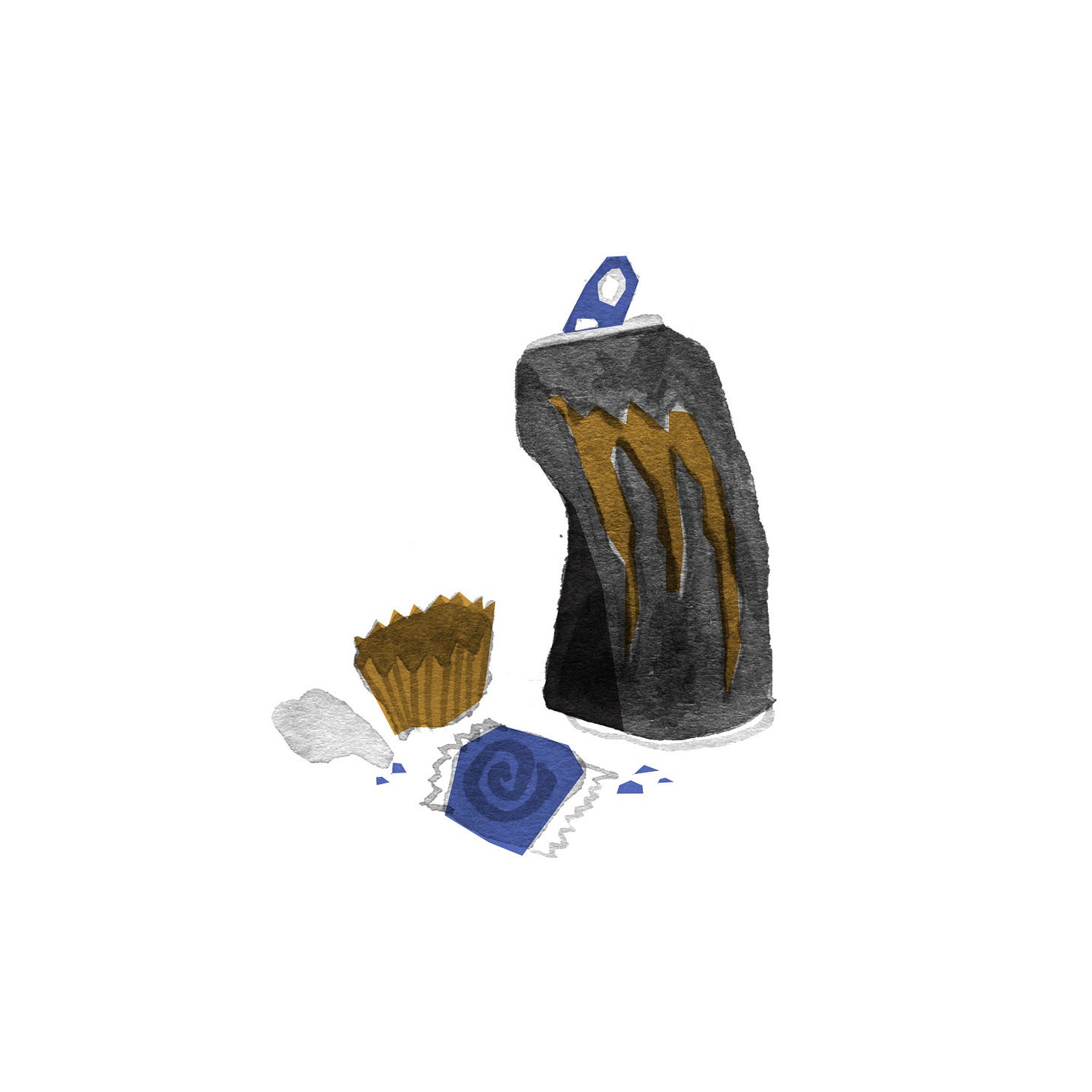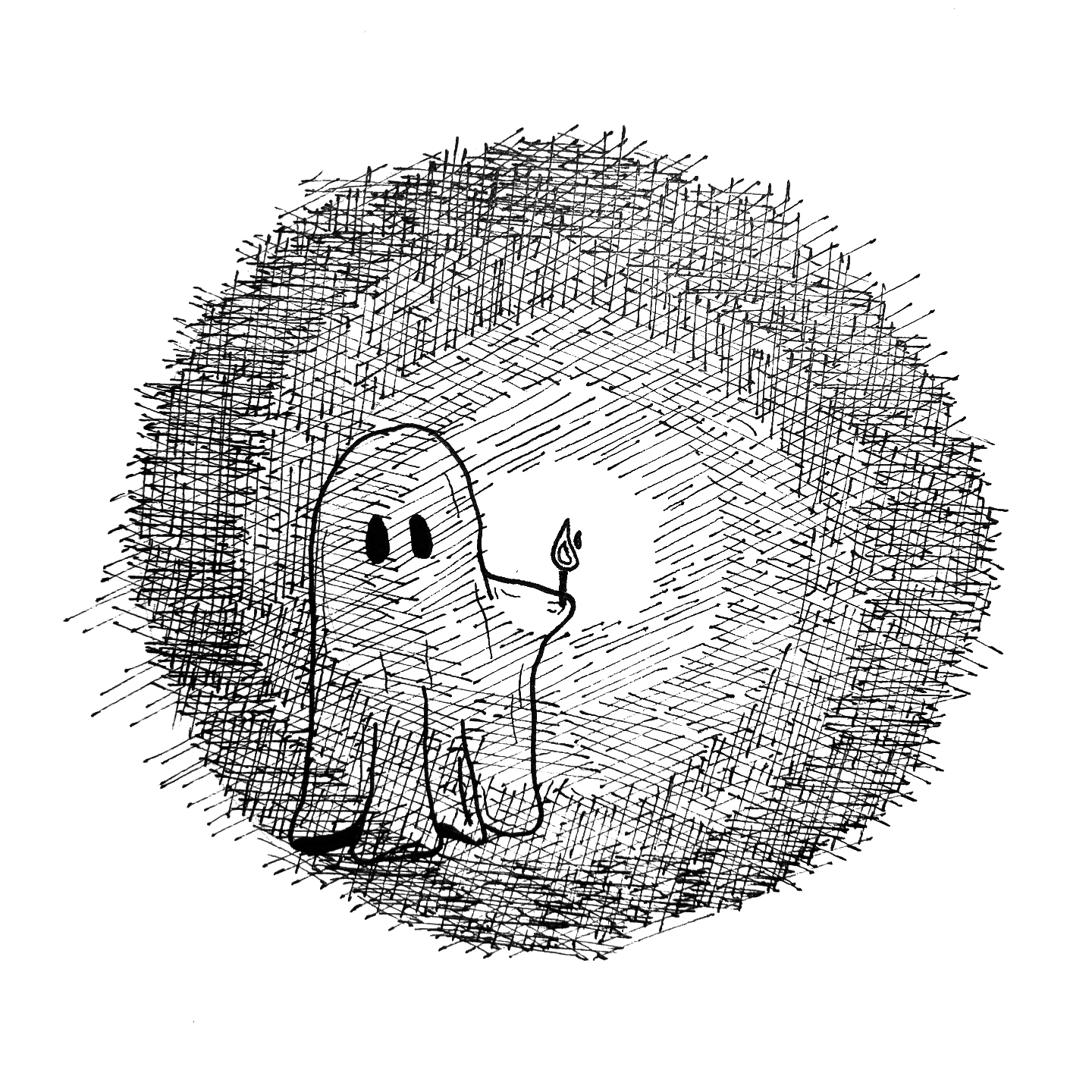The Legend of the Convenience Store Cashier by Anna Vangala Jones
"He was beautiful but not in the way of a movie star or something. Beautiful in the regular person way. Beautiful to us."
So excited to get to feature this Anna Vangala Jones story today! One of those stories that I fell immediately in love with — that collective “we” voice, the struggles and oddnesses and beauties of growing up, the mythmaking, in general, but especially of someone from afar, someone unknown, a person of desire onto whom you can project whatever you want. I hope y’all love it as much as I do!
—Aaron Burch
Listen to Anna read the story:
We would all gather in the convenience store parking lot some Friday nights and watch the cashier leave. His shift ended at 8pm and he’d make his way out the door around 8:10 or so—head down, eyes on his sneakers that might have once been white long ago, one hand scrounging through the deep pockets of his baggy frayed jeans for car keys.
It was just two or three of us at the beginning but as word traveled among our friend circle, the numbers started to climb. No one wanted to feel left out on Monday morning when he’d occupy a few moments of discussion before homeroom.
He was beautiful but not in the way of a movie star or something. Beautiful in the regular person way. Beautiful to us.
We didn’t have much else to do in our town besides hang around various parking lots, sitting on our cars and talking and eavesdropping. Everyone from school used to meet up at the 24 hour diner until they started kicking us out for not spending any money and just trying to smoke there for hours. The convenience store parking lot was popular because the people working inside never gave us any trouble and we didn’t bother them.
Beyond that, our decade old friend group was restless with anxieties that—while not unique for our age—loomed large for us at the time. Two of us were looking at colleges in other parts of the country, one was struggling just to pass and graduate with the rest of us, one harbored hopes of a basketball scholarship, one wanted to travel abroad, and we were begging another not to move in with her much older boyfriend yet—the obnoxious manager at our favorite ice cream place. We were often fighting with each other and supporting each other and gossiping about each other and loving each other and hating each other and missing each other, even though our time of being inseparable was not over yet. It was like we were nostalgic for those days while we were still living them—longing for what was right in front of us. But we so badly wanted to escape it all, too. The end of high school in the not so distant future and our impending separation and the unknowns and uncertainties like who would remain in our hometown and who would flee and never look back were always simmering just beneath everything we all said and did together. The convenience store cashier was a welcome distraction to bond us in relative harmony, at least for a little while.
One day the cashier’s car was parked next to one of ours so we could see into the backseat through his window without much effort or explicit snooping. There were several books strewn across it. We couldn’t make out any titles without drawing attention, but we joked about how maybe he had a whole other secret life as a published author with a pen name. Other times we believed him to be an obscure poet. In another story, he was a friendly librarian, very good with children.
When those options felt too dull and we preferred the image of him living outside the law, we decided he was a cashier by day and a jewel thief by night. On a rainy afternoon at the mall, we even detailed one of his fictional heists. He was almost captured but evaded the authorities and now was on the run.
“Guess we won’t see him at the store anymore.”
“Maybe working at the store is him being on the run.”
“Huh?”
“Like being a cashier is his new life as a fugitive. That’s his disguise now after escaping.”
“Oh. So, like his jewel thief days are in his past. He’s not one anymore.”
For some reason, we were kind of dejected and disappointed by this prospect.
“Well yeah, if he still was one, why the fuck would he be here in this nowhere place?” We all laughed even though it wasn’t completely funny. “What jewels are there for him to steal here?”
“This is where you’d hide out until you get the call to go do that one last heist before you’re too old.”
“Exactly. Then you get back out there on the road and run the hell away from here to somewhere better.”
“What do you think his next identity will be if he gets away again after that last heist?”
“Train conductor. That way he can at least look out the window while he works and see some nature instead of a parking lot.”
We liked that idea.
It was like we were nostalgic for those days while we were still living them—longing for what was right in front of us.
The first time we saw her—the one who would soon be known to us only as the convenience store cashier’s girlfriend—we were surprised. We had forgotten to even consider the possibility that he’d been out in the world living a whole layered life, as specific as it was mundane, and bearing no resemblance to the ones we’d idly imagined and invented for him.
At the beginning, she would drop by to visit him during his shifts, sometimes with her friends and sometimes on her own. They were still in the flirting and misunderstandings stage, which was fun to watch but also stressful. They were nervous and would go so quickly from teasing and laughing to looking for and misreading signals or missing them entirely. But they would always end their meetings on a good or promising note.
They then transitioned to her coming alone at the end of his shifts with them holding hands and catching up about their days while eating a snack he’d grabbed for them from the store before getting into their cars and heading to their next location. We never saw any passionate making out or anything; they didn’t really seem the PDA type. Then again maybe they were when they went out on actual dates instead of just hanging around in the parking lot at his job.
We wondered if he ever asked her to be his girlfriend or if they both just knew. Whenever we were close enough to overhear them, there was no doubt they had become official and serious.
“Ready to go?”
“Yeah,” she said, “but you know I suck at directions.”
“Okay, I can just drive us both there and then bring you back to your car after, or you can follow me so you don’t get lost.”
“The first one.” She smiled at him and we almost smiled, too. She was as beautiful as he was and they were happy.
“I love you,” he said.
“I love you, too, loser.”
We’d never heard them say that to each other before, but it was also clear it was not their first time saying it. We wondered what that had been like. We decided it probably happened in a darkened movie theater, that they said it as their fingers met in their giant tub of popcorn at the most exciting part of the movie because they were more interested in each other than the plot.
We told our friend, see how nice the cashier is to his girlfriend—not like your rude old boyfriend. Don’t move in with him. You should break up with him. He’s too old.
One night the convenience store cashier’s girlfriend showed up just before his shift ended. She seemed excited to tell him some kind of news. We slowly followed her into the store and then split up, moving through the aisles so we could catch their brief conversation from different angles as he guided her to the back room so they could talk in private. We caught the gist, before the door closed behind them. She’d landed some big audition for a tv show.
They didn’t stay much longer. We never saw her again.
The convenience store cashier’s girlfriend moved on—maybe to pursue acting. But he was still there. Collecting dollar bills from and returning change to people who barely even noticed him before sometimes passing a group of teens in the parking lot who maybe noticed him too much.
One Friday night, we went in to buy some snacks and saw an older woman behind the cash register.
“Hey where’s the other guy? The one that’s usually here?” we asked.
“If you knew him well enough that he’d want you to know where he is, you’d already know,” she said. “Why don’t you go get a magazine and look at the boys in there instead.” She laughed as we scattered without buying anything.
It took us a few more weeks of his absence to realize he’d quit his job and not just gone on a vacation. It was so unexpected that it barely registered as anything much at first. Certainly not a momentous occasion in comparison to the other more memorable events of our senior year of high school. As time passed and graduation approached, we didn’t have much chance to remember to think of him at all. But still we felt his absence and couldn’t help but wonder and every so often exchange theories on what he might be doing now instead.
They became something almost like campfire stories. Telling each other fanciful tales of what happened to him. What hurt him. What motivates him. What dreams he may carry in his heart. What scares him. What had finally led him to leave the one place we associated with him so much that it was inextricable from his identity. The legend of the convenience store cashier.
“If you knew him well enough that he’d want you to know where he is, you’d already know,” she said. “Why don’t you go get a magazine and look at the boys in there instead.”
Summer moved much faster than we wanted. We knew our lives would soon be diverging. We didn’t want to waste time being sad or doing anything too special or out of the ordinary. We knew what we’d miss most was just being together, doing the same old boring things we’d always done. So we picked an evening we were all free to go get high in our usual secluded spot in the woods along the river. There was a nice parting in the trees there where the bright light of a full moon bathed us enough to be able to see our hands even after night fell. We smoked and told the same stories for the thousandth time and relived our favorite memories and made fun of each other until there was nothing left to say. We grew pretty relaxed and cozy but sad, too.
We all lay flat on our backs, our tongues finally still, and looked up at the stars blinking at us from overhead. We were quiet and calm like that for a while. We were getting tired and likely would’ve started the process of leaving when we heard the unwelcome sound of twigs and dry leaves cracking under feet with a heavier tread than ours.
We had met up to drink and smoke weed in the woods by the river at night, under the protection of only a dark sky and the moon, many times before without ever getting murdered. But isn’t that how these tragedies always work? You do something that’s part of your normal routine—things that seem so benign and commonplace to you that you don’t even give them a second thought—you do it a hundred times but it’s the hundred and first time when it all goes wrong. And then everyone who reads the news story about you shakes their heads and comforts themselves by saying, well I would never have done that. You would never catch me hanging around in those woods at night.
We didn’t have to say it to each other aloud to know we were all thinking the same thing. That our fate to follow the plot of the most familiar horror movies was probably inevitable now.
But when we sat up and got a decent look at the intruder’s face, we thought it had to be the weed making us all hallucinate the same vision. It was the convenience store cashier. He’d gotten a haircut and his formerly naked jaw now had a five o’ clock shadow. But it was him.
He stopped walking not too far from us. Close enough for us to see him but far enough for him not to notice us if we stayed quiet. He looked up at the moon and opened his mouth as if to say something to it.
“Werewolf?” one of us whispered and the rest of us laughed without sound into our hands.
Then we saw he was holding something bulky, blocked from our line of vision by his body. As he bent over to place it on the ground, we could make out that it was a case of some sort. He sat down on a log and removed a guitar from the case. He fiddled with the strings for a bit and cleared his throat a few times and then opened his mouth and began to sing.
Our collective guilt was overwhelming. This was such a clearly intimate and private moment, not like the times we’d watched him behind a cash register or walking out to his car or even hanging around with his girlfriend in the parking lot a few feet away from us. This was something he should’ve been able to do alone without our eyes and ears there to interfere. If we moved an inch, he’d be sure to hear us and panic at the unintended audience. He’d probably recognize us. There was nothing we could do now. We had no choice but to slowly lean forward and listen.
We aren’t musicians but we were teenagers who spent most of their time listening to CDs. Our taste wasn’t so maturely developed or discerning but from the expressions on our faces, it was a united response. He did not sound very good. We don’t know if it’s that his pitch was off key, his tone a little whiny and trembling, or the halting way in which he tried to match the rhythm of his singing with his less than proficient guitar playing. We just knew we felt terrible that we were there to hear him in such a vulnerable moment.
We were embarrassed for him, for ourselves, for the silent trees—a captive witness to his shame and ours. It wasn’t a song we’d heard before and it’s not one we’ve heard since, so we thought maybe he wrote it himself. We wondered when it would end. But as he continued to sing and strum and as we kept on listening, the more mesmerized we became. We were no longer a group of bored teenagers spying on and speculating about him for months on end, but rather each a concerned individual really seeing him for the first time. His grasp of the notes didn’t improve and his voice still shook. But his performance took on a charm and depth of emotion we hadn’t known him capable of possessing.
His voice soared above us and the treetops, catching in the cool night air. His eyes were closed by this time and so were ours. Our hearts were listening to his song now as much as our ears. The thing is he still might have sounded as mediocre as when he first started or maybe something had changed and the haunted melody pouring forth from his mouth and fingers was suddenly as profound and transformative as we thought it was. It didn’t really matter. He had moved us.
When we realized the music had stopped and we looked at him again, he was crying. It started soft and uncertain and then built into a torrent of angry tears and loud sobbing. He stood up, guitar in hand, and stormed over to one of the trees with the thickest trunk. He reared back like he was about to smash the guitar against it as hard as he could. We glanced around at each other, wondering if we should reveal ourselves in time to stop him. But he just stayed there in that position for a while until the crying slowed down into quiet little gasps. Then his shoulders dropped and he held the guitar up in both hands, staring down at it. Without a word, he walked over to the nearby river and at its shallowest point along the bank, he gently placed the guitar in the water. It balanced upon some rocks, holding it there safe from the flowing water, at least for the moment. As he turned and walked back in the direction he’d come from and the wind carried the sound of his footsteps away, we only hesitated briefly before darting forward and rescuing the guitar from the river.
We felt bad to do it, but we followed him home that night. We didn’t even know his last name let alone where he lived. But we were so sure he’d regret what he’d done—leaving his dreams of another life behind him in the woods—that we had to try to undo it for him. We didn’t know if we were doing the right thing or not, but we only debated it a short while and then acted on instinct. We lay the guitar on the ground outside his closed door and after only a quick look back to check that no one was watching us from any windows, we left.
We don’t know if he was afraid of its immediate reappearance. If he was relieved to see it not gone after all. If he appreciated it. If he tossed it in a dumpster. If he thought it was some kind of mystical intervention or if he guessed exactly what happened—that a strange person or persons saw him throw it away and brought it back to him in case he changed his mind. We don’t know but we wanted him to take it as a sign to keep playing the guitar. We wanted him to keep singing.
We’ve all since gone our own ways. Some to college, some to jobs, some to aimless travel, some leaving our hometown for good, some staying behind. We don’t all consistently keep in touch though we’ve fractured off into pairs or trios that do remain close. The tales of the convenience store cashier have faded in our shared memories, replaced by ones of more significance to our own lives. Faded but not forgotten.
Sometimes when we do think of him or someone brings him up, we do so fondly. We call him the singer from the woods. We imagine the concert venues and adoring audiences in his present or future. We imagine him singing a duet with the love of his life at night in the woods before proposing and hearing her say yes. We do it for him, but it’s also at least partly for ourselves. It gives us hope for our own lives—still as unknowable to us as his.
STORY:
Anna Vangala Jones is the author of the short story collection Turmeric & Sugar (Thirty West, 2021). Her writing has appeared in Wigleaf, Necessary Fiction, HAD, X-R-A-Y, and Berkeley Fiction Review, among others, and been selected for Longform Fiction’s Best of 2018 list. Find her online at annavangalajones.com.
*
ART:
Zoë Petersen is an illustrator from the Desert Southwest. She loves to knit and believes there is power in the term "grandma craft." Until Craft Grandmother can be her official title, she'll keep making pictures for stories.
Next Tuesday, we’ll feature an interview with Anna about this story!








A lesser writer would have had the cashier marry.
A much lesser writer would have had the man's singing evoke ancestral memories of troubadours traveling town to town, mesmerizing loved lorn damsels with his voice.
Instead Anna V. Jones holds true to her first description: someone beautiful as ordinary people are beautiful. We ordinaries don't sing heart-stoppingly-gloriously, but --- when no one is watching --- we do sing with honest emotion.
Returning the guitar was an act of love as powerful as the emotion that inspired the song. It told him someone wanted his song to continue. It stopped a suicide of the soul.
So emotional and bittersweet! It reminds me of the conflicted feelings that come with the end of high school (or any chapter in one's life). I loved the banter between the friend group and it was so heartbreaking, yet emotionally satisfying, to see how they grew apart with time. Great read, and I hope to see more of your work in the future!